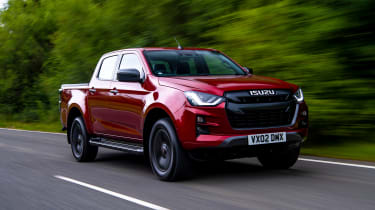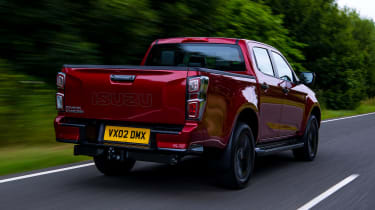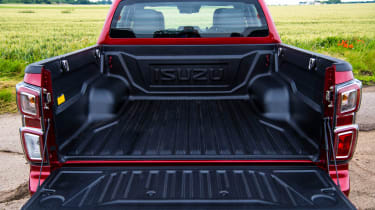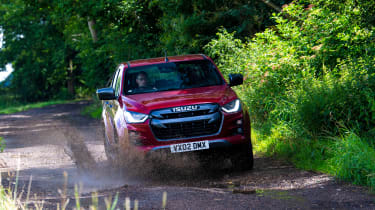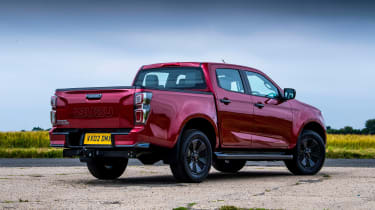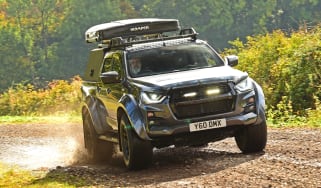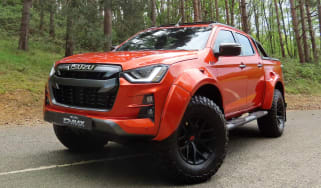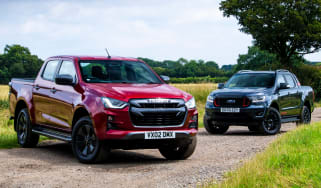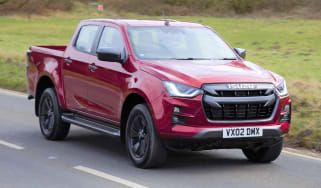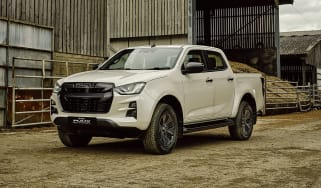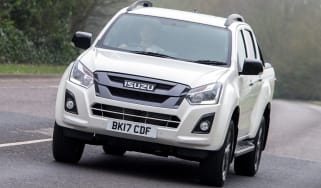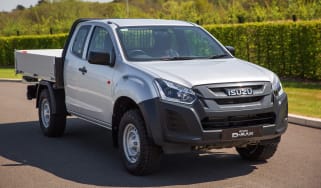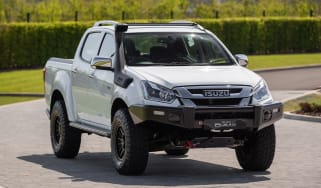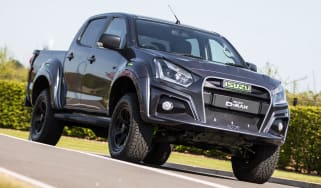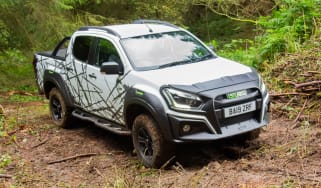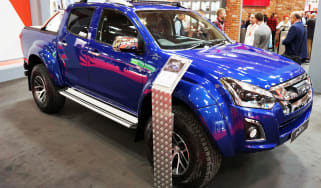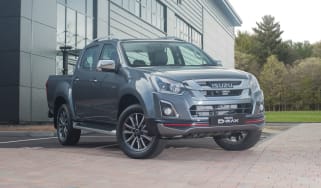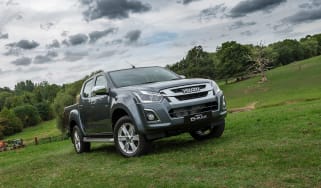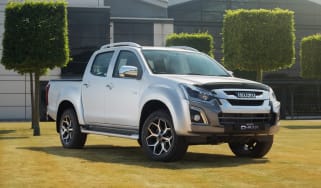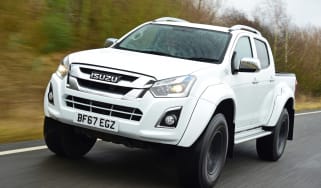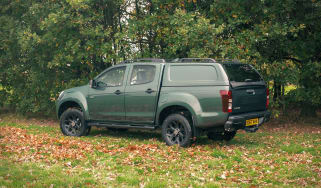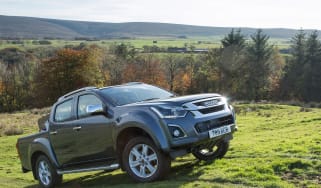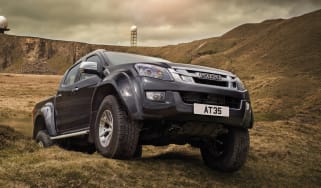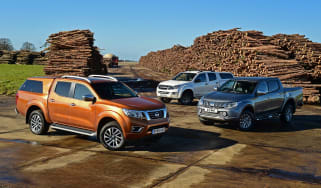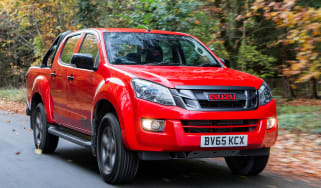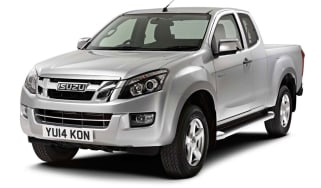Isuzu D-Max review
With sharper looks, improved kit and low prices, the new Isuzu D-Max pick-up is now a strong challenger to mainstream rivals
PCP finance available
The Isuzu D-Max pick-up is the only model the brand sells in the UK. The entry models are basic and utilitarian, but there are also high-spec versions that can easily serve as a family car as well as work transport, just like many other pick-up trucks on sale in the UK.
Rivals for the Isuzu D-Max include the Toyota Hilux, Ford Ranger and SsangYong Musso, but the range of pick-ups has shrunk in recent years, so it’s an interesting time for Isuzu to launch this new model. This Mk3 model arrived in 2021 and gets a much more modern look than its predecessor, along with decent levels of kit and appealing low prices.
About the Isuzu D-Max
One of the first things you notice when looking at the new Isuzu D-Max is the “double-fang” grille that makes it look quite aggressive from the front, and is coloured differently depending on which trim level you choose. The Utility model is the entry point, and is available in single cab, extended cab and double cab body styles. Then there’s the DL20, which comes in extended and double cab forms, while the DL40 and V-Cross variants are double-cab only.
While it’s a new design, this model still uses the traditional body-on-frame chassis - but it’s lighter and stiffer than before. As before, there’s switchable four-wheel drive that lets you choose between rear-wheel drive or high and low-range 4WD, plus a standard rear differential lock. This means it’s as good off-road as you would expect.
More reviews
Car group tests
In-depth reviews
Road tests
The interior has been upgraded for this model, and there’s now a large nine-inch touchscreen in the top-spec model plus dual-zone climate control and leather seats. It’s a pleasant cabin and more upmarket than before.
The new D-Max uses a 1.9-litre diesel engine with 162bhp and 360Nm of torque, so it can tow up to 3,500kg, the maximum permitted for this type of truck. It’s available with six-speed manual or auto gearboxes, though we reckon the auto is the one to have.
Prices for the D-Max start from around £21,000 for the most basic single cab Utility version, though most will opt for a DL40 double cab, which costs just under £30,000. The top-spec V-Cross version is about £31,000, and you’ll need to add VAT to those if you’re a private buyer.
MPG, CO2 and running costs
There’s only one engine option, a 1.9-litre turbo diesel engine, which has 162bhp and 360Nm of torque.
With the six-speed manual gearbox, the entry-level D-Max returns 33.6mpg, with CO2 emissions of 220g/km. Move up to a high-spec model with an automatic gearbox and that drops to 30.7mpg and 241g/km of CO2, though they’re all Euro 6D compatible.
In the old model you didn’t need to fill up with AdBlue, but this has changed for the new model as the maker faces tightening emissions regulations.
With a commercial vehicle, you pay a fixed rate of tax, which has benefits if you’re also considering a passenger car. It also means company car tax is less of an issue, if you’re a fleet buyer. The D-Max is good value however you buy it, though - it’s well equipped and prices are lower than for rivals such as the Ford Ranger.
Load space and practicality
Some pick-ups are only available in double-cab form, but the D-Max is still available in single and extended cab variants. The basic Utility model is where to look for these, plus the 4x2 (rear-wheel drive only) drivetrains. All versions are capable off-road but you’ll want a 4x4 if you are using the truck for serious off-road use. The low-range gearbox and locking differential means that it’s a very capable truck.
The single cab model has a 2,315mm long load-bay and a maximum payload of 1,205kg. Next is the extended cab, which has a 1,805mm load bay and a 1,140kg payload capacity, and then finally the double cab, which has 1,495mm and 1,115kg capacity respectively.
All models can tow up to 3,500kg except the rear-wheel drive model, which can pull 2,500kg. It’s a practical workhorse and matches the Ford Ranger in this area, which is our favourite truck on the market.
There are plenty of accessories to choose from, including load covers and hardtop backs in various styles. Plus there are tow bars, roof bars, frames and cargo rails to hold loads in place in the bed.
There are simply too many accessories to list here, but it’s safe to say that if you have a specific need for a D-Max, there is likely to be something in the catalogue that can help you.
Reliability and safety
Safety is a real strong point for the D-Max. It’s the only truck on sale that has a five-star Euro NCAP safety rating under the most modern (and most stringent) rating system. There’s loads of safety kit too, including cameras in the windscreen to facilitate forward collision warning and automatic emergency braking, plus traffic-sign recognition and lane-departure warning.
On automatic versions you also get adaptive cruise control and lane assist - though we felt these systems were too sensitive and could be unpleasant to use.
Isuzu doesn’t appear on our annual Driver Power customer satisfaction surveys so it’s tough to get feedback from owners - but the D-Max has an enviable reputation for total reliability. The brand offers a five-year/125,000-mile warranty on all models, which shows how confident the brand is about the D-Max.
You can get locking load bay covers and hard tops for security with tinted glass or even full metal panels instead of windows, though clearly this restricts visibility when driving.
Driving and performance
There’s only one engine in the D-Max, a 162bhp 1.9-litre diesel, but you can have it with a manual or automatic gearbox. The latter would be our choice, because the manual isn’t very pleasant to use.
It also has a very short first gear, which is helpful when towing something very heavy but a bit of a frustration most of the time. You might as well treat second gear as first if you’re unladen. The auto is better but not perfect: it’s a bit ponderous at junctions and isn’t as responsive as the 10-speed auto in a Ford Ranger.
The engine itself is strong, but it’s very noisy. It delivers its power higher in the rev range than some other diesels, so you end up having to push it harder than normal - which means you notice the rattly sound and vibrations more, too.
The gearbox has an “on-the-fly” 4WD switch, so you don’t need to stop before engaging four-wheel drive for off-roading. The rear diff lock is different, as this only engages in low-range mode at speeds below 5mph. The D-Max is a great off-roader, with great traction, plenty of ground clearance and good visibility.
On the road, the higher-spec models are best if you’re considering one as a mixed-use vehicle. The more basic models are louder and bouncier, but the high-spec trucks in the range offer more cruising comfort without losing out on off-road ability.
Cab and interior
The D-Max range starts with the Utility models, which are pretty basic inside. They get cloth seats and a sparse cabin, though you do still get Bluetooth and DAB radio. Manual air-con is standard too, and safety kit is good.
Go for a higher-spec DL20 model for heated seats and a leather steering wheel, or the DL40 for electric leather seats and a seven-inch touchscreen with Android Auto and Apple CarPlay. These versions also have keyless go and dual-zone climate control.
The top-spec V-Cross has a nine-inch touchscreen, keyless entry and a much more luxurious feel than the lesser models.
Storage is good inside the double-cab: there are two glove boxes, plus a storage cubby on top of the dash and pop-out cup-holders. There’s a central cubby under the armrest and more cupholders in the centre console.
